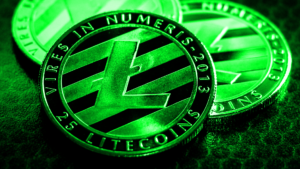Ethereans have jumped head first into two narratives which ought to send your eyes to the back of your head. In fact, George Orwell must be rolling in his grave as these terrifically dystopian prospects, which follow his writings to the letter, are being openly promoted and endorsed by certain crypto factions.
Following the launch of Meta’s already-teetering Threads, a Twitter-clone that requires users to give up biometric information in order to use the platform, Worldcoin opened its doors by championing a similar policy of no privacy by default. Potential users can download the World App, and after visiting an “Orb”, a biometric verification device which requires iris identification, a user will receive a so-called ‘World ID’, as well as tokens created out of thin air and backed by equally thin tokenomics (i.e., a multi-level-marketing ponzi scheme).
Ethereans promote dystopian iris-scanning project
Popular Ether evangelists and blockchain educators from Bankless nation have promoted the project before and during launch. For his part, Vitalik Buterin doesn’t appear to have any fundamental criticisms about the project, and instead said that “to Worldcoin’s credit, they have also committed to decentralise over time”, perhaps unaware that Sam Altman took his OpenAI project from open source to closed source; a suspicious transition given the size and scope of the project.
As reported by The Block, Vitalik outlined four risks to the project’s viability, available here. Speaking about possible solutions to solve Worldcoin’s technical challenges, Vitalik said that more data aggregation is necessary, and that combining social-graph-based, general-hardware biometric and specialised-hardware biometric techniques could provide a solution against fake identities.
In other words, Vitalik Buterin does not view Worldcoin as a centralised dystopian nightmare comparable to China’s dystopian social credit system, but believes that with some tinkering, Sam’s Worldcoin can get back on track. Try square that circle.
The idea that one private (or public, presumably) institution deciding ‘proof of personhood’ predicated on whether you gave up sensitive information in the first place is not a cause for concern in Vitalik’s view. Indeed, Buterin, often touted as the foremost promoter of crypto decentralisation, has no problem with a singular company controlling an individual’s virtual existence provided it promises to become more decentralised in the future.
Vitalik pledges $100 million to defunct ‘pandemic preparedness’ projects
The red flags from the Etherean community and the Eth co-founder Vitalik Buterin, do not end there, however.
In early June, Vitalik and Polygon’s Sandeep Nailwal donated $100 million to covid-19 ‘pandemic preparedness’ projects amidst compounding evidence which indicates that Western nations’ approach to covid-19 was not only scientifically unfounded, but that it likely caused devastating effects on human health. Specifically, all cause-mortality following rushed mRNA inoculations witnessed a sustained spike across countries and jurisdictions since 2021, and has yet to be explained. One peer-reviewed study that examined excess deaths in Germany in 2020-2022 found that “something must have happened in spring 2021 that led to a sudden and sustained increase in mortality.”
At the time, the out-of-the-blue comments from Vitalik Buterin were curious given the tattered and deeply disconcerting history of ‘pandemic preparedness’ policies in 2020-2022.
Merely human delusions
It’s important to note that George Orwell was not overly concerned with fascism as he regarded it more as vermin; something that didn’t need to be refuted as it was plainly verifiable in and of itself. Instead, Orwell was concerned with Communism, so much so that many of his works revolved around refuting it, as is commonly known.
Orwell realised that a case had to be made against the delusions of civilised people; the chief delusion being that there might be a higher, more enlightened way to organise society by following the carefully crafted machinations of a one-party initiative. The ever-loving embrace of one ideology which is above scrutiny because its ideals, when properly administered, would solve all problems.
It appears that with some effort, Vitalik and the Ethereum community might have obtained this delusion, and perhaps unwittingly, are engaged in laying the groundwork for this fantastical utopia.
Of course, anyone of average emotional and mental health attempting to make sense of Ethereum narratives is unlikely to get anywhere. The task is simply too big.
And at the end of this rabbit hole one is left with more questions than answers. Regardless, I’ll attempt to distil a straightforward question for the Ethereum community given the information currently available: behind the veneer of technical complexities mere plebeians such as myself couldn’t possibly understand (or would ever dare understand, you see), is Ethereum truly following its professed ethos of decentralisation, or has it succumbed to merely human delusions?
Join the telegram channel for updates, charts, ideas and deals.
Did you like the article? Share it!


